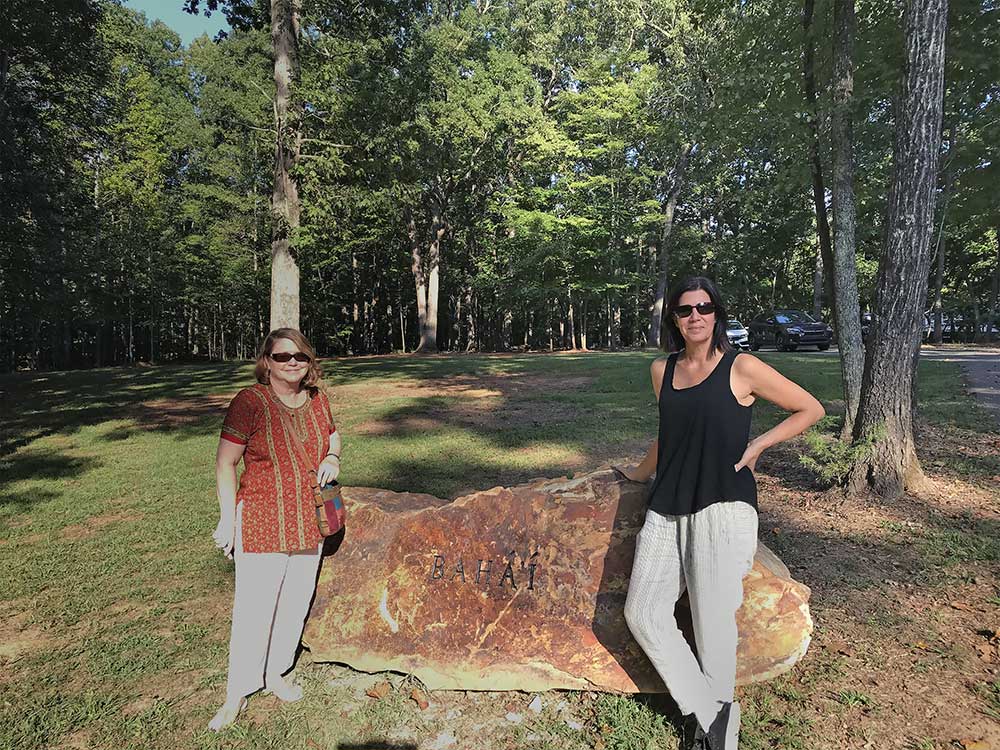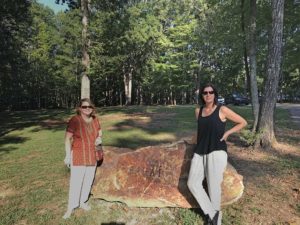



When a Baha’i leaves this world, the Faith’s teachings give the surviving loved ones certain responsibilities to show respect for the body — the temple of the now-departed soul.
In 2014 the Baha’is of Charlotte, North Carolina, embarked on an effort to support families and friends in carrying out these duties in a way that is consistent with the Faith’s laws.
The Local Spiritual Assembly, the Baha’i community’s governing council, is responsible for assisting community members in matters of marriages, deaths and other life-cycle events.
The Assembly worked with a nearby cemetery to establish a section designed to comply with Baha’i guidelines.
This and related goals were accomplished even though the journey of learning that led to them wasn’t always “as straightforward as we’d anticipated,” says Tamela Rich, an Assembly member.
First step: education
When the Assembly appointed a task force five years ago to study the issue, its first step was to educate itself and the general Baha’i community about Baha’i burial laws — as well as how funeral homes and cemeteries operate.
The task force invited two area Baha’is, Nancy Roberts, a trusts and estate attorney, and Diane Rinnix, a nursing instructor with years of experience working in hospice, to make a presentation in 2015 for local Baha’is. The two would be called upon many times after that for their expertise.
It was learned that the aspects of Baha’i law currently binding on Baha’is in the United States are the following:
Optional practices are to lovingly wash and shroud the body in preparation for burial, and to place a ring bearing a specific passage from the Baha’i writings on the deceased’s finger. The cemetery is making a room available with everything needed for these preparations.
Some of these elements are similar to Jewish and Muslim burial practices, the task force learned, and funeral directors are familiar with them.
Seeking the physical space
The quest for a possible Baha’i cemetery also was a learning process. After investigating North Carolina law and considering such factors as continuous care of such a property, she says, members “decided to see if we could find an existing cemetery that would carve out a ‘cemetery within a cemetery’ for Baha’is.”
While they were at it, task force members began asking local funeral directors and cemeteries about their services and pricing so they could assist Baha’is and families as needed.
Ellen Treon, a task force member, learned that “a lot of American traditions of embalming and transport of the body can be traced back to the Civil War when soldiers were transported back to their families.”
The role of funeral directors was also a revelation, she says; some of them have business agreements with specific cemeteries. And while North Carolina law allows a family member to prepare the body and arrange its transport, “the cemeteries have a requirement that a funeral director has to be present for opening and closing the grave. Also some cemeteries require vaults,” she says.
Relationship with a cemetery

Years of research finally turned up a cemetery that was eager and willing to do everything the task force asked, says Rich.
“The entire task force started meeting with the director, asking questions, looking at land and requesting that all the plots be laid out [with the person’s feet toward] the Qiblih” — the holiest spot on earth for Baha’is, where Baha’u’llah, prophet-founder of the Baha’i Faith, is interred in Akka, Israel.
The staff at that cemetery, Forest Lawn East in close-by Matthews, “was eager to know everything about Baha’i law,” says Rich, and “made suggestions based on experience helping other faith communities establish similar cemeteries.”
The need to provide certain supplies to families became known early in the learning process. In 2015 a newly deceased Baha’i’s family, not originally aware of the burial law, contacted the task force after being told of the resources it could offer.
After that contact, the family did all it could to meet the Baha’i requirements.
“That’s when the task force realized the need to put together supplies [for loved ones] to prepare the bodies if they wished to do that themselves,” says Rich. The task force presented three such sets of supplies to the Assembly for storage. They included shrouding materials and rings.
First ‘full-on involvement’
That preparation was put to use in 2017 when a Baha’i was killed in a vehicle accident. The family, mostly Baha’is, called on the task force to assist in preparing the body and arranging the memorial service. “It was our first full-on involvement,” says Rich.
A year later, a Baha’i in a neighboring community passed away suddenly, and the family asked the Assembly about burial supplies. Says Rich, “The deceased’s daughter said it was a great relief in the wake of such tragedy to have everything at hand.”
Fast forward to the present: The arrangement with Forest Lawn East was finalized in 2018.
Weather during winter 2018–19 delayed laying out all the plots at Forest Lawn East, a process the funeral director calls “pinning.”
But by the time an ailing Baha’i went into hospice nearby in South Carolina, the task force was ready. His wife, though not a Baha’i, contacted the Assembly in Charlotte because she “wanted everything to be done ‘right,’ just as [he] would have wanted,” says Rich.
This Baha’i was the first to be interred at Forest Lawn, on March 21, 2019, coinciding with Naw-Ruz, the Baha’i New Year. Since then, the funeral director at Forest Lawn has assembled supplies like those the task force was providing to the Charlotte Assembly.
Efforts to beautify the Baha’i cemetery section are nearing completion as well.
“In collaboration with Forest Lawn, we have finalized a landscape design, including a focal point in the direction of the Qiblih,” says Rich. “The benches and centerpiece are being carved from granite in China and we expect them to arrive around the first of the year.”


![]()
![]()
Whether you are exploring the Bahá'í Faith or looking to become an active member, there are various ways you can connect with our community.
Please ensure that all the Required Fields* are completed before submitting.